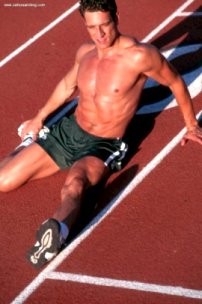 So
what excited you about it?
So
what excited you about it?News - Feature Stories - Magazine - Robert Gant
Robert Gant works it out
 So
what excited you about it?
So
what excited you about it?
It was ballsy. I loved seeing the kissing, I loved seeing just the free physical expression, the freeness of sexuality. I thought the show looked really beautiful—like an independent feature in its style: the ramp shots, different split-screen kinds of things, and just all sorts of stuff that I didn’t tend to see on prime time. I think my first thought was the classic actor envy. [Laughs] I think maybe part of me didn’t want to watch it because I wasn’t getting to be a part of this neat thing, to be perfectly honest. It’s hard sometimes if you see something that really excites you that you would love to be a part of. I didn’t used to be able to watch the Academy Awards back when I was in law school because I was so painfully aware of the fact that I wasn’t getting to do the thing that I really wanted to do, the thing that I was really passionate about.
Well, before we get you to law school, we need to get you back to Florida, where you grew up.
Tampa. I went to sort of a mixture of public and private schools. [I grew up as] Bobby Gonzalez [and that’s still my name]. The reality is, I’m as much Italian, Irish, and English as Spanish. My dad’s Spanish-Italian, and my mom’s Irish-English. There’s a little Scottish in there as well. Maybe some French, but I think that’s arguable.
When you look back at your childhood, do you see signs from very early on that you were going to grow up gay?
I can remember when I was in first grade playing cops and robbers with this kid Johnny and this girl Marissa. And I remember that the goal of the game was that whoever caught the other person would have to sit on them. And I remember Marissa really wanted me to catch her, and I remember I wanted Johnny to catch me! [Laughs] And I remember it being this battle of wits between Marissa and I, whether she could get me to be the one, and I did everything I could not to catch her and to get Johnny to catch me. I guess it was even earlier than that, although that’s the only really early one that I’m cognizant of.
When we talked earlier, you mentioned feeling like you grew up with the “best little boy” syndrome. Tell me what that means to you.
Well, I was a kid who was, by hook or crook, gonna find a way to win, to escape. I think I wanted to escape being middle-class or blue-collar. I felt like I was in prison. I think I said this before: Freedom is my big buzzword in life. It’s just my favorite word. And I think so many of my choices have been about gaining freedom. I wanted to go away to college. I wanted to break out of whatever earning pattern my family was in. I wanted to be accepted. I wanted to have a beautiful partner. So I fell right along with the cultural norm.
 To
me, when you say the “best little boy in the world,” it means somebody
who feels like there’s an ideal that they must fulfill.
To
me, when you say the “best little boy in the world,” it means somebody
who feels like there’s an ideal that they must fulfill.
Right. I wanted to win. I think I saw myself as a loser, given my circumstances. Where I was from, where I lived, what we didn’t earn, the fat that I had on my body, whatever these things were. I didn’t want to lose. For eighth grade I went to an all-boys high school—Jesuit—and I remember being elected for student council when I first got there. And then I ran again at the end of the year, and I wasn’t picked, and I really think it had a lot to do with the fact that I wasn’t one of the guys. I had done a play. I played football, but I think I felt so much apart from my peers that I probably was just as guilty of perpetuating that separation.
And you were realizing that you were gay. When you’re saying you were not one of the guys, was that part of it?
Absolutely. Absolutely. I had a pretty well-crafted facade [by high school]; I knew how to pass. I knew what to say and do to get by and not to be flagged.
And you knew, without anybody telling you, that it was better off to have people think you were straight. A
bsolutely. Yeah. Yeah, all the messages I received, whether in my family or from my peers, was that gays were weirdos and just different. “It’s just a really bad thing to be gay.”